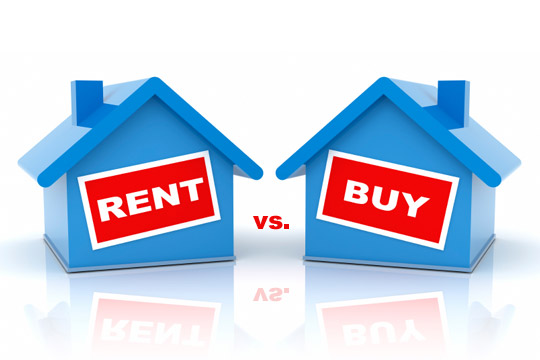
A life time decision: Rent or Buy ?
Purchasing a home can be a daunting process for many people. A potential buyer may find it difficult to determine which housing option makes the most sense for his or her circumstances. People often try to find answers and discuss the relative advantages and disadvantages of renting versus buying. The relative importance of emotional considerations such as security, pride of ownership, the freedom to change, remodel and adjust your house according to personal preference can only be measured by the prospective homebuyer. It’s not a secret that people grow up learning that it is a must to “own ” a house, it is one of the main priorities someone should have in his life. The financial aspect of buying a house is usually considered irrelevant as it is a must and a status symbol in our society to own a house no matter what … However ,other elements of comparison are largely financial and a prospective homebuyer should evaluate these elements objectively. Buying a house in most cases is a lifetime commitment and one should be 100% sure that they are ready and capable to proceed with such a financial investment, especially when purchasing a house involves the use of finance.
Advantages of Renting
Renting is an option that a large part of families and people have to take as they cannot afford to climb on the ladder of ownership, but it is also an option for many people who believe that for their personal way of living, renting is the ultimate option for their housing needs.
Some of the most important advantages of Renting over Buying can be summarized as follows:
-Renting gives the tenant greater mobility
-Renting requires less financial commitment and risk
-Renting has fewer responsibilities
Mobility. A renter can always move faster, easier and cheaper than a homeowner. A tenant has only to give the required notice to the landlord or wait until the lease expires before moving out. In the case of a renter who has to leave abruptly, the only relevant cost that will apply is any deposit or prepaid rent that may be forfeited .Still he is almost always sure that the cost will be less than the cost of selling one house (the seller will receive a forced sales value instead of the actual market value due to the emergency of selling…) and buying another. Usually selling a home takes time and includes a lot of side expenses. (Commissions’, taxes lawyers etc)
Maintenance and Repairs .For a renter, any cost of maintenance or repairs is usually included in the rent and is the owner’s responsibility. Tenants have no direct responsibility of doing any repairs and do not participate in any sudden large expenditure for unexpected repairs.
Amenities. In several cases someone who decides to rent can enjoy the use of recreational facilities, such as swimming pools, tennis courts, gym (etc) that would be beyond his financial reach and budget if he was to buy or build a house with the same.
Financial Commitment. The initial cash outlay to rent a home or an apartment, compared to the funds necessary to buy ,is quite modest .Usually a security deposit and two months of prepaid rent are the requirements for someone to move into a new house. Comparing the cost to rent even in conjunction with low-down payment financing, the cash required to purchase a home (the down payment, loan fees, closing costs, taxes) normally far exceeds the cost of moving into an apartment or a rental home. A very important aspect is the fact that buying a house with a mortgage is a financial commitment for a long period of time that is not very flexible and could create big losses in the bad scenario of forfeiting to repay the loan. In contrary renting a house is very flexible and can easily adjust to the tenant’s financial afford ability by simply moving out from one house to another that is cheaper.
Financial Risk. Renting a house involves little financial investment in the rented premises and the neighborhood where the property is located. Therefore there is minimum financial risk in Renting. If the property values in a neighborhood decline and the neighborhood becomes run down or otherwise undesirable, renters can simply give a notice and move away. A homeowner in the same neighborhood has to face the risk of losing money because of the property value depreciation.
Advantages of Buying
Buying instead of renting could provide both the subjective advantages of security and personal satisfaction and the financial advantages of possible equity appreciation.
The main advantages of buying could be summarized as follows:
-Security
-Privacy and freedom from restriction
-monthly payment
-Investment appreciation
Security. Owning a house provides a certain amount of security in knowing that someone can continue to live in the home as long as he wish ( no matter his financial affordability) or at least as long as the mortgage payments are made ( in case of finance) .A renter has no real security beyond the term of the lease. When the lease expires or when the landlord gives the required notice, a renter could be forced to move out against his will and find another place to live.
Privacy and Freedom from Restrictions. Owning a house provides greater privacy than renting and more freedom to use the property. The owner can redecorate or remodel the house to suit his taste and fit the family needs. Possibly can keep pets, maintain other activities that could be prohibited by most rental agreements which determine the specific use of the property.
Monthly Payments. If you purchase a house with the facility of a mortgage, monthly mortgage payments usually start out higher than the rental of an equal lodging. However over time rents usually rise at a faster rate than mortgage payments. (Especially if the mortgage has a fixed interest rate).If the mortgage loan has an adjustable interest rate, payments may increase rapidly if interest rates rise, but they will decrease if interest rates go down. Thus it is quite possible for a monthly rental payment to eventually exceed a monthly mortgage payment.
Investment Appreciation. Although it is impossible to predict whether or how much a particular home will appreciate in value, over the last several decades, average home values are increasing at a rate higher than the inflation rate. (In most of the developed countries around the world) .Typically, a homeowner will enjoy an increase in home equity and thus an increase in net worth value as property appreciates in over the years. When someone is about to purchase any property, they should research properly the market values and proceed only if they are not overvalued at the moment of the transaction.
Comparison of Renting and Buying
Many property professionals intend to use worksheets and complicated equations to compare the net costs of renting and buying.(Dozens of applications are available on the net) They take into account not only the monthly mortgage or rental payments but also the homeowner’s increases in equity and the benefit of possible income tax deductions. In several cases the results demonstrate to prospective buyers that the overall cost of buying a house is often less than the cost of renting.
But every case is different. The interest rates involved, duration of a mortgage which will determine the amortization term, actual market values, personal needs of the buyer, financial equity, expected future income, are some of the variables that usually affect the comparison between renting and buying a house.
In Summary, renting a house provides less financial responsibility, easier daily life as the landlord is responsible for repairs and maintenance to the home at no cost of time, expertise, or money to you. Sometimes heat and utilities are included in the rent, depending on where you live and the type of property it is. In some cases you can enjoy higher quality standards and usually there are no taxes to be paid. Signing a lease is for a relatively short time. You commit yourself for a year or two, (in most cases) and if you want to live somewhere else, when the lease ends you notify the landlord and move out. In fact, you may be able to end a lease early if you can find a new tenant or the property is in demand. This flexibility of renting is a major advantage if you take a job in a different city or simply want a change of scenery.
Buying can have a number of financial advantages as well as other personal advantages that have more to do with the feelings of accomplishment and satisfaction that owning a home can provide. Among the reasons buying is attractive to many people is that as you pay down your mortgage balance, you increase your ownership share or equity in your home. (In contrary every time you pay your rent your money represent no future value). Equity in this context is the difference between what your home is worth and the amount you owe to your lender. When you buy a home using only your cash, the investment risk remains almost the same. If property values go up—which may or may not be the case—your home will be worth more and your equity greater. This increases your net worth, and if you move, you may be able to sell your home at a profit.
Of course, one of the risks of owning a home is that housing prices may be flat or falling, so your home could be worth less than you paid for it. If you’re not in a hurry to sell, you may eventually realize a profit. But you can’t ignore the fact that real estate is not a liquid asset. You can’t always sell when you want to, at the price you want—or sometimes even sell at all—if the economy is in a difficult period or if demand in your area is weak.
So, if you’re considering your next housing move, there are good arguments for renting—and for buying. At the same time, both renting and buying have some drawbacks, which should be as important in your decision-making process as the factors that make them attractive. Take your time and balance all the variables in order to finally decide what will meet your real requirements and needs with the minimum risk .The risk factor is one of the primary reasons you must weigh for any home purchase. Decide carefully before you act. There is not a guaranteed rule when it comes to rent or to buy a house. Consulting a property professional could help you to make a better decision.
Written by Kosta Kioleoglou REValuer ,
Chief Strategist (CSO) for the East African Region
Director of Engineering – Property Appraisal & Valuations
Civil Engineer Msc – DBM
Taylor Scott International
(Konstantinos Kioleoglou)


